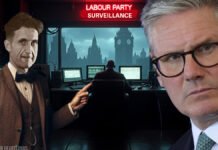Former Partygate investigator Sue Gray refuses to take part in inquiry into proposed move to Labour Party
A government inquiry into former Partygate investigator Sue Gray’s proposed move to the Labour Party has been put on hold after she refused to participate in the probe.
Gray’s appointment as the Labour leader’s chief-of-staff caused controversy among Tory MPs, given that she led the official government probe into Downing Street rule-breaking during lockdown.
The cabinet office is now investigating when Gray’s discussions with Sir Keir Starmer and or the Labour Party about the senior party role actually began, while the anti-corruption watchdog, the Advisory Committee on Business Appointments (Acoba), is reviewing the terms of her departure.
The government launched the Whitehall investigation following concerns that she had been in contact with Labour about the role while she had responsibility for investigating alleged rule-breaking in Downing Street.
The controversy surrounding Gray’s move has led to accusations that she may have breached the civil service code. The Whitehall report into her conduct has not been released, and MP Mark Jenkinson has raised questions about how Gray might have reacted to someone who failed to comply with her investigations.
Gray’s decision not to participate in the inquiry has prompted speculation about the reasons behind her refusal. Dave Penman, leader of the FDA union which represents senior Whitehall staff, has said that Gray is prioritising the government’s anti-corruption watchdog investigation over the Cabinet Office’s.
Meanwhile, Labour leader Sir Keir Starmer has denied holding discussions with Gray about employing her while she was investigating his opponent Boris Johnson. However, the question still remains did anyone else representing the Labour Party and or Sir Keir Starmer officially or not have communications with Gray in relation to a position with the labour party once her contract with the civil service had expired?
Under Whitehall rules, top civil servants are expected to wait a minimum of three months before taking up outside employment and check with Acoba if they take a job within two years of leaving government.
In a statement to the House of Commons, Mr Dowden said the government had made a “confidential assessment” about whether the former Partygate inquiry chair had broken any rules in engaging with the opposition and had forwarded it to the Whitehall anti-corruption watchdog.
But the written statement did not say whether the Cabinet Office deemed her to have broken rules, as had been suggested.
Instead, Mr Dowden pointedly quoted the directory of civil service guidance which says any contact between senior civil servants and leading members of opposition parties should be cleared by ministers.
He also stressed the requirement for “absolute trust” between officials and ministers, while pointing out that her role meant she was considered as being under the “politically restricted” category of the Civil Service Management Code. He goes on to say that “impartiality and perceived impartiality” of the civil service is “constitutionally vital to the conduct of government”.
The statement came as an expected official report into Ms Gray’s conduct failed to materialise on Tuesday –apparently after intense discussions between cabinet secretary Simon Case and Conservative ministers.
The report would have represented a significant political intervention against a former civil servant, and would have come just days before the local elections when the government is meant to observe so-called “purdah” rules on political impartiality.
Under Whitehall rules, top civil servants are expected to wait a minimum of three months before taking up outside employment.
They are also meant to check with Acoba if they take a job within two years of leaving government. The watchdog can recommend a delay of up to two years in starting a new job, though it has no power to block appointments.
Acoba is yet to make it decision, which will be made separately to the Cabinet Office inquiry triggered by the government.
Gray was deputy permanent secretary in the Cabinet Office from May 2021 to March 2023. The government has made a “confidential assessment” about whether she broke any rules in engaging with the opposition and has forwarded it to the Whitehall anti-corruption watchdog.
The controversy surrounding Gray’s move to the Labour Party raises questions about impartiality and perceived impartiality of the civil service, which is constitutionally vital to the conduct of government.
Support Independent Journalism Today
Our unwavering dedication is to provide you with unbiased news, diverse perspectives, and insightful opinions. We're on a mission to ensure that those in positions of power are held accountable for their actions, but we can't do it alone. Labour Heartlands is primarily funded by me, Paul Knaggs, and by the generous contributions of readers like you. Your donations keep us going and help us uphold the principles of independent journalism. Join us in our quest for truth, transparency, and accountability – donate today and be a part of our mission!
Like everyone else, we're facing challenges, and we need your help to stay online and continue providing crucial journalism. Every contribution, no matter how small, goes a long way in helping us thrive. By becoming one of our donors, you become a vital part of our mission to uncover the truth and uphold the values of democracy.
While we maintain our independence from political affiliations, we stand united against corruption, injustice, and the erosion of free speech, truth, and democracy. We believe in the power of accurate information in a democracy, and we consider facts non-negotiable.
Your support, no matter the amount, can make a significant impact. Together, we can make a difference and continue our journey toward a more informed and just society.
Thank you for supporting Labour Heartlands












